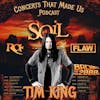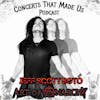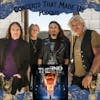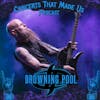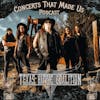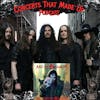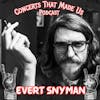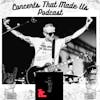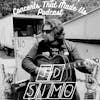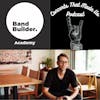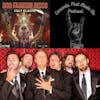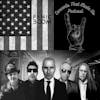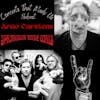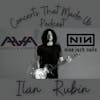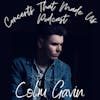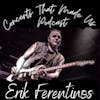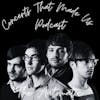The Power of Presence: A Conversation with Danielle Soccio
On this episode, Brian is joined by Danielle Soccio.
Danielle was quick to make her public mark as a singer and actress, writing and producing one-woman shows, performing at premier concert halls along side Australia’s stars of stage and screen, and on live television, before viewing audiences of millions of people in Australia and overseas. She has appeared in cabarets and musicals such as The London Palladium's The Sound Of Music for Gordon Frost Productions.
During the interview they discuss Danielle's early musical memories, her journey in the music industry, and her experiences as a performer. Danielle shares her challenges in pursuing a career in musical theater and the importance of authenticity and connection with the audience. She also talks about her coaching work, helping others overcome internal blocks and tap into their full potential. Danielle emphasizes the power of presence and energetic presence in commanding attention. She concludes by discussing her mindset as an artist and her future plans, including writing a book.
Find Danielle Soccio here:
https://www.daniellesoccio.com/
https://www.facebook.com/DanielleSoccioAwakenYourVoice/
https://www.instagram.com/daniellesoccio_awakenyourvoice/
https://www.youtube.com/channel/UC6jRvoiGAVCLJXbX1pw1c8A
Find CTMU here:
https://linktr.ee/Concertsthatmadeus
Newsletter: https://concertsthatmadeus.aweb.page/p/f065707b-2e34-4268-8e73-94f12bd2e938
If you would like to support the show you can do so by rating/reviewing us on Itunes and Spotify or by signing up at https://www.patreon.com/Concertsthatmadeus
Save 10% on Band Builder Academy membership by following this link https://bandbuilderacademy.com/Brian_Concerts/join and using promo code "concerts" at signup.
Become a member at https://plus.acast.com/s/concerts-that-made-us.
Hosted on Acast. See acast.com/privacy for more information.
Brian (00:00:00) - Danielle, You're very welcome to concerts that made us.
Danielle (00:00:04) - Thank you. Thank you so much for having me. I'm glad to be here.
Brian (00:00:07) - It's great to have you know, I'm a I'm excited to get some insights into your career from performing all the way up to what you do now. So you're a singer, a performer, speaker, voice and leadership coach. But I'd like to start at the very beginning. Can you tell us your very earliest musical memory?
Danielle (00:00:26) - Uh huh. Wow. I don't know. I guess besides singing in my lounge room as a as a kid to my mom's ABBA and Barbra Streisand albums, I would I would have to say, uh, you know, through high school, I, you know, I got so involved with music and the musicals and things like that. And, you know, it's just really found my passion there. I, I first discovered I was a singer really on a trip overseas. So I have some relatives initially, actually. And my cousin was in the church choir there.
Danielle (00:01:07) - And, and she ran the choir and she would bring me along to the practice and I would just be singing with them. And they all sort of turned around to me and said like, Wow, you can actually sing, you know, you've got a good voice. And that's when I realized at the time I was only about 12 or 13 years old. So when I came back from that, I, I just started, you know, joining in at things at school, really. And I think that's a great place to start. You know, just I'm really glad that I threw myself into that. And then things just progressed after that. I knew I wanted to pursue music or performing in some way. I wasn't quite sure how. So, you know, I just put myself out there as a freelance singer and just started getting as many gigs as I could. You know, most of them were probably, you know, friends, friends who booked me for for their events and things like that.
Danielle (00:02:07) - But but soon enough, you know, I took off. I started joining some cover bands. I got my confidence up in really, you know, working with an audience and just became quite established as a as a, you know, a freelance singer here in Melbourne. You know, I, I then started producing some one woman shows. I did, you know, things that sort of really interested me, like, you know, tribute to Barbra Streisand. Of course I had to do that and I knew all the repertoire. And you know, I did sort of Broadway tribute shows and things like that. And and then eventually just my my regional music and. And then, you know, it was great. I just I just developed a little bit of a momentum, a reputation. And I started to do, you know, a lot of the major television events here in Australia. We have something called Carols by Candlelight, which is probably the biggest television event, live television event here in Australia.
Danielle (00:03:12) - And that's a Christmas Eve thing. And that was wonderful. You know, that was in front of, you know, about 3 million people viewing live and 30,000 people in the actual audience and 3 million across, you know, television sets, you know, back in those days. And, um, yeah. And then then that led to some other big concert events to, and, and eventually got myself into some musical theatre. And I did the London Palladium Sound of Music when it came to Australia. And yeah, so it's been quite varied. Yeah. But that's, that's where it's at. And all along I've been recording some music along the way and, and doing some writing and releasing some, some songs there too.
Brian (00:03:59) - You know, I'm always intrigued by how performers find their style and their voice. You know, what makes a guy to say what he's going to be like? A screaming black metal artist. So when it comes to you, how did you find your style and your voice? What decided that you were going to be the type of artist you were?
Danielle (00:04:18) - Actually, that's what I really struggled with.
Danielle (00:04:20) - As you can see, just from what I've told you was quite varied. What I what I was interested in. And I think I think that was what I struggled with most of my singing career, that, you know, people really wanted to put you in a box. And it was like, Oh wow, if you're doing musical theater, then you can't be a pop singer and you know, vice versa. And and, you know, maybe things have changed a little bit now, but, you know, over the last decade or two, that's pretty much where it was at. I would I would audition for for musical theater. And they would say, you know, you're too sometimes you're too polished or you're too, you know, like and then then I'd audition for like, pop managers and, you know, to try and get a record deal and they'd be like, oh, you know, you're, you're not edgy enough. And, you know, so, you know, go back to the other way.
Danielle (00:05:12) - And it's like I found it really, really challenging and really confusing. And I think, um, I don't know, I think I was just, just really enjoy more classic contemporary adult music, whatever that is, you know, and, and, and, and think there wasn't a huge market for it in Australia. It seemed that that type of music was appreciated more in maybe the USA or Europe, but. I think musical theatre was was a real passion because I love the acting side of it as well. And and I guess just naturally I can sing that quite well. So I kind of fell into that more cabaret musical theatre style for a few years there because it just it just felt fun. It felt really joyful. So but I've always kept up, you know, recording albums and trying to, to, to get some music out there of my own as well.
Brian (00:06:05) - Yeah, yeah. And you know, from you mentioned you started off joining Culver bands and then you made the leap to theater.
Brian (00:06:14) - What was it like trying to break into theatre? You know, it's a side of it that we don't really get to talk about too much on this show. So is this kind of similar to getting a band or a singing career off the off the ground?
Danielle (00:06:29) - Oh, it's it's a little bit different because you're not really because you can't it's not like you can go out there and, you know, get some gigs happening in your local pub or something like that and really, you know, just get get the momentum going. You've really got to find an agent. That can be challenging in itself, you know, And because there's so many people, you know, competing for a small amount of shows and so there's only so many people that the agents will take on. And then if you get yourself an agent, which I was lucky enough to get you, you know, you're just on the audition circuit and and you just turning up for these auditions and you're just hoping that the the director sees you in that role.
Danielle (00:07:17) - And, you know, often it's a case of your, your two, you know, your stature is not right. You know, you have the most perfect voice, you know, whatever. It's something like that. But you're just not not the right look or or vice versa, you know, like it could be you sort of got what we want, but, you know, we're not sure, you know, if how your voice would match the other leading role or something like that. Like there's just all these these sort of things that that you're up against. And so it is quite challenging. And then some of the, you know, you can't be in every show unless you are what's called a triple threat. So a triple threat is somebody who's excellent in singing, dancing and acting. Now, not everybody is a triple threat. And, you know, I'm not a highly trained dancer, but I did have my acting and singing down pat. But, you know, so then I may have missed roles because I wasn't such a strong dancer for a role.
Danielle (00:08:14) - So, you know, it's it's challenging. And if you do want to go down that musical theater road, you know, you really want to you do want to be, you know, quite skilled in all of those areas, if possible.
Brian (00:08:26) - Once you start getting all this success, appearing on stage, going overseas, appearing on TV, can you walk us through what that time period in your life was like?
Danielle (00:08:36) - Oh, it was wonderful. Yeah, just. It was it was great. There were a couple of years there. I was just getting on all the TV shows and it was just wonderful because these are shows that I, I watched growing up. You know, I would sit there, you know, looking up, looking at the, you know, the TV screen in my living room, dreaming of being on on those shows. And then when suddenly I was being chosen to be to be there, you know, it was it was really wonderful and just just a really beautiful experience.
Danielle (00:09:12) - And you just get so many people, obviously nearly the whole country is watching it. So, you know, you get so many people like so happy for you. And yeah, it's wonderful exposure. It's to, you know, to sing solo on stage in front of 30,000 people sitting in front of you. You know, like, that's not often we get that opportunity. Yeah. No, yeah, yeah. And plus I had a huge choir behind me in an orchestra, you know, like, where do we ever get to do things like that? So it's pretty, it's, it's, it's really, really wonderful. If you can, if you can have that type of experience, you know? So I was very, very lucky. But I persisted a lot. You know, I really I really persisted to to put myself out there in a big way, you know, to to get onto those shows.
Brian (00:10:03) - Yeah. And the podcast is called Concerts that made us. So we have to I have to ask you, as a concert goer, what concerts do you think have made you?
Danielle (00:10:14) - Mhm.
Danielle (00:10:17) - I love concerts. Just about concerts. I rarely miss one that comes to town. My best memory, I think, was seeing the Michael Jackson band tour. Oh, my God. That was. That was amazing. I can remember skipping school for the day, you know, going to Olympic Park Stadium here in Melbourne and lining up and and being near the front of the stage. And, you know, just this swarm of people just in the middle of the of the grounds in front of the stage. And people were just I can just remember. You know, girls fainting and they're just bodies being carried across, you know, on top of me, you know, of these women who are just passed out, just being handed to, you know, to to the security guards and stuff. It was it was an experience. And I was always a Michael Jackson fan growing up. So that that that was very memorable. Um, what else? Concerts that made me I've seen so many that, you know, um.
Danielle (00:11:30) - You know, it's like something I saw as recent as Harry Styles. You know, I think he's great. I think he's good fun. You know, you really, really works the crowd and brings an audience that are just there to to really enjoy themselves and to be seen by him, you know, like he's really connects well with his audience. And I think that's so rare, you know, where people really connect. But, you know, you to, um. Stevie Wonder.
Brian (00:11:59) - Oh.
Danielle (00:12:00) - Yeah, yeah. I'm going to see Lizzo next week so I can let you know.
Brian (00:12:05) - That would be a fun one, I imagine.
Danielle (00:12:08) - Think so. I think that's why I signed up for that. I think that would be a really good one. I saw Michael Bublé recently. He's great. He's great fun. You know, he brings his great, fun personality into it. I even saw Rod Stewart and Cyndi Lauper recently, too. And, you know, just just watching these really seasoned performers, um, you know, that these songs, you know, like Elton John, you know, they their music just keeps just keeps there's so much meaning in it, you know, after all of these decades.
Danielle (00:12:40) - And I think they're the probably the artists that that move me the most when I'm at concerts.
Brian (00:12:46) - Yeah and when it comes to assure you know from picking out the tickets to actually going what do you look for in a show? What makes it so good that you're going to walk away saying, I'm going to remember that for a long time?
Danielle (00:12:59) - I really love it when the artists interact with the audience, like we really see the real them. Like, you know, like I can remember when I saw Beyonce many years ago and, you know, maybe Janet Jackson as well. That just comes to mind. And the shows were very well produced. You know, it was very structured, you know, and it was an amazing, you know, beautiful productions. But there was very little just very natural interaction with the audience in between songs. And so I would walk away going, Oh, well, that was amazing. But I never really felt like I got to really know them or see them. And I think that's a shame in live performance.
Danielle (00:13:44) - I really think that those that show us their personality and just get real with us and and let us in, you know, to their inner world for a moment. That's magical. I think for me, I tend to to, to, to go and see shows where people really allow their personality out a lot more. Um, I tend to gravitate towards those shows a little bit more now, I think. Yeah.
Brian (00:14:14) - Yeah. I remember years ago seeing a Kris Kristofferson and he literally just walked out on stage, picked up his guitar and starts singing. And it was as soon as the song ends, he started another one. There was no audience interaction at all. And even though he's like a legend, it was one of the most boring concerts I've been to. You know, I'm like you. I prefer if the singer sits down on stage and starts telling a story about the next song they're going to sing or something, you know?
Danielle (00:14:45) - Yeah, Yeah. And you know, somebody who also comes to mind is Prince.
Danielle (00:14:50) - So you know how Prince was renowned for coming back at the end of his concert and just spending another hour or so just singing and performing for his for the audience, you know, And like, I experienced that. And even though he didn't talk an awful lot and, you know, it's just like he was just there. For us, it was just like, I'm just going to sing all night if I have to for you guys, you know? And it was like it was unbelievable. I felt like I was in his, you know, private space, you know, And he was just playing for us unscripted, you know, And and it was, you know, that that that's probably another one that comes to mind that, you know, really impacted me.
Brian (00:15:32) - We'll jump back to your own performances then. Out of all the shows you've done, is there one that sticks in your mind is maybe the most perfect experience you have?
Danielle (00:15:43) - Wow.
Danielle (00:15:44) - That's a really tough one. Um, look, some of those television experiences were really, really, really good.
Danielle (00:15:52) - Really, really beautiful experiences. I got to really showcase my my voice in a way that I want to, like, really sing big epic songs. And, you know, that's what I love to do. And so I think having the opportunity to do that was was really amazing. And. And then to walk off the stage and know that I really felt like, yeah, that was a good performance. You know, I the it was, you know, pretty amazing even back then that, you know, I wasn't fully focused on how big the situations were, but it was more I just felt like I was meant to be there. Like I just knew in my heart that, you know, this was I just belonged on that stage. And and so I just felt I just have this memory of just feeling so comfortable and and so grateful for this, this amazing opportunity and to be able to showcase me and the way I want to. I think if we can be seen and heard in the way we want to as artists, that's really important.
Danielle (00:17:05) - And those sort of opportunities allowed me to do that. And even my very first cabaret show, which was that tribute to Streisand, um, you know, I just, I just wrote that show like I just sat down and wrote that so quickly and, and I think. You know, it was it was a great experience for me because I didn't even know I was, you know, capable of producing a one woman show, you know, And I just kind of went out on a limb, booked a theater and ran it for for for a while and and had great audiences and, you know, so just taking risks and and seeing them pay off. And I think it's because I'm doing what. I'm good at, you know, I'm sticking with I'm sticking with where my heart is in performing rather than trying to be what I'm not. And I think that's that's when it's worked well for me. I've been happy with those type of performances.
Brian (00:18:08) - Yeah. In order to one woman shows, then how do they compare to the larger productions?
Danielle (00:18:16) - Well, it's just 100% me.
Danielle (00:18:18) - Sorry. So it's just me on the stage. And, you know, sometimes I would just have made a piano player, you know, and or a small band. And. And. It's so it was just so intimate, you know? Really? Just me telling stories. And. And then. And then singing and, and, you know, the, the whole, the whole attention was sort of on me. Whereas when you're in those sort of bigger productions, you're part of a team, you know? And, um. But there are wonderful experiences, you know, to have to have been. You know, in even even The Sound of Music, which was another dream come true. Because, you know, growing up, I, you know, we loved watching that movie and singing all of those films. And and to be in such a, you know, professional show with with a lot of leading musical theater artists here in Australia, that was that was a wonderful, wonderful learning experience because the cast was full of very, very seasoned performers.
Danielle (00:19:31) - And you can learn a lot, you know, working with people like that. And that's what I really loved about that particular show. You know, just learning from people who have been doing this for a long, long time and very successful.
Brian (00:19:46) - Yeah. And you know, when it comes to live performances and theater, not everything always goes according to plan. So, you know, on those nights where things maybe started to fall apart a bit, how did you overcome them?
Danielle (00:20:00) - I just go with it because I just think, you know, look, there is thing things are out of our control and we can't help it. And you know, once I was running, I was doing a new show and I was running a test version of it. And, you know, we had been there in the afternoon. We had sound checked the mics and everything. And and then as soon as the show started, there was just some kind of feedback issue or something going on with the microphone. I was just like crackling, you know, And I literally just had to stop the show.
Danielle (00:20:40) - Like I literally after it, I was looking around sort of as I'm performing, you know, like just kind of because, you know, I was right. I just had to dive straight into this, this performance. And and I was kind of looking around and thinking, surely someone's going to come and help me out here. And and, you know, I think no one really knew what to do. And so I literally just went, I'm just going to stop the show right here and get this sorted out, you know? And that was that was I think that's probably the only time something really major like that's happened to me. And, you know, it was luckily it was just the test run of the actual show. But even if it was the main one, you know, I think your audiences are forgiving and, you know, just just go with it, you know, don't I guess I just don't expect things to go perfectly, so. You know, if you reduce your expectations, then then when things do go wrong, you know, you're not going to get so so thrown by it or so frazzled by it.
Danielle (00:21:42) - So, yeah, just, you know, keeping it real, keep things as real as you can, I think.
Brian (00:21:48) - Yeah. Good advice there. And I always ask my my guests water pressure and Portia ritual is before going on stage. You know, you hear these stories of these rock guys who maybe down a gallon of vodka before going on stage or even bands that maybe say a prayer before going on stage to psych themselves up and then wind down afterwards. How did you approach it? Did you have any rituals before you'd walk out on stage?
Danielle (00:22:16) - Yes, I always have, and I still do so. I. I would pray definitely, you know, just have that little prayer. You know, I just think that's always that's always nice to just tune into and put out there. Definitely just I don't eat much. So don't, you know, make sure I don't have much food in my stomach. I'm very well hydrated, so plenty of plenty of water. Unfortunately, no bottles of vodka or whatever you said, because I think.
Danielle (00:22:52) - Yeah, that's just not my way. And and in fact, I find alcohol so drying on my throat that I actually it's enough to make me just go numb. I'm just not going to bother with that. And I think, um. Yeah, I think I don't really need to have something to make me loosen up. Look, maybe. Maybe it wouldn't hurt, you know? But I never really felt like I've, you know, I want to get up on that stage and and, you know, be intoxicated. It's just never been something that I'm interested in. If it was a relaxed gig, you know, I might have, you know, I might do it with them. Have a few drinks or something beforehand, but that it wouldn't be a serious gig, it wouldn't be an important show or anything like that. So it's just vocal, warm up, hydration. And then there's something else that I do more recently, which is an embodiment exercise that I've learnt to really ground myself in my body, which, you know, which is more in line with the coaching side of, of, of what I do.
Danielle (00:24:05) - And there's, what I have found is the trick is to really get out of your head because if you're, if you're in your head and what I mean by that, like worrying about it, you know, oh, you know who's in the audience? Did I sell enough tickets or, you know, when I was singing those songs today, it just wasn't feeling great or, you know, like, you know, when you've got all this stuff in your head. Um, I hope everyone likes it. You know? I hope this goes well.
Brian (00:24:37) - Questions?
Danielle (00:24:38) - Yeah. Like all these kind of thoughts that that are going through our head. And if we're in that part of ourselves, you know, like we're, we're really bringing our focus to that. And then you think about that, you bring, you walk up onto the stage and you're in that state. You're very. You're very disconnected, you know, from from what I what from what I call, like, the essence or the soul of yourself and.
Danielle (00:25:09) - You know, that's where we perform from. That's where we create from, you know, the true, the true essence and the soul of ourselves, like the love of it, you know, all of that. You know, the part of us that that that, like me as a little kid, was dreaming about being on the stage one day or, you know, that part of me that just loves singing or, you know, just that's the part that we want to be focused on. And what I have found in these embodiment practices that I now teach is if you can get really still and present and just bring you spend a couple of minutes just getting in your body. And what I mean by that is just kind of just tuning in to certain parts of the body. So you could use your heart or your sort of even down in your belly, you know, because we hold a lot of emotions in this part of ourselves and we tune into that. And you just spend a little bit of time almost kind of meditating on it, you know, just just closing your eyes and breathing and you can start to feel an energy sort of grounding you, you know, and you start to move away from those thoughts that are ticking over and.
Danielle (00:26:19) - And then you leave your attention in your body and then you kind of walk up onto the stage and there's a whole different energy within you and around you that you can you can tap into this. Everyone's got this ability and I've been using that mostly in the last couple of years and I get my clients to do that as well. And. Something happens. It's like even now, even the singing instrument, like the vocal instrument just lines up so much better. Like there's something just much more fluid about it. It's just there's much more connection to a deeper part of ourselves. And, and, you know, there's less tension in the throat or the chest or, you know, like, there's this tension in our mind and and everything just opens up better and lines up better. And so even this instrument that's functioning to try to produce great sound works so much better, but with less effort. And that was a really important shift for me because having been a singing coach as well for so many years through my whole career, it was very, you know, technique based and that's how we were trained.
Danielle (00:27:36) - You just learning how to get your technique really on track and dealing with just the physical aspects of it. But there's this whole other side of us, you know, the emotional side, even that energetic side, and we more so need to be tuned into that. And when we can and when we can really cultivate that, then that's when these really super powerful performances start to happen. And that's I've experimented with that a lot since since I've been doing this stuff. And it works wonderfully.
Brian (00:28:13) - Yeah. And you know, I'm looking forward to hearing about what you do now. But I have one final question about the performance side of it. How do you go about creating and working on how you build a connection with the audience?
Danielle (00:28:29) - Well, my my belief is that if you can if you connect with yourself, you know, if you really connect with a deeper part of yourself, the vulnerable side of yourself, the emotional side of yourself, and you're singing from that place or performing from that place or even, you know, dancing or acting.
Danielle (00:28:50) - It doesn't matter what you're doing, but you're just performing from that place. And athletes do this too, you know, and speakers do this. Like this is this is these are tools anybody can use. When you really connect in with a deeper part of yourself or the or the emotional vulnerable points of yourself. We tend to like that the mask that we tend to wear, you know, this kind of invisible mask that we wear, which is just natural, you know, it just kind of melts away. And and then that just allows the audience into our world, you know, and that allows me to project that out onto the audience. And when we have that energetic exchange. And they can feel that energetically or emotionally. Then that's when we truly connect. So. And guess that's why I love those artists. You know, as we were speaking earlier, you know, in concerts, you know, that's that's exactly what I'm talking about. They they they open up and let us into their their real world or their vulnerable world.
Danielle (00:30:04) - And I think that's the most powerful way to connect with audiences. Just be truthful. Just be open. Just be.
Brian (00:30:11) - Be yourself. Yeah.
Danielle (00:30:13) - Be yourself. Be honest. Just be natural. Let us. Let us see. You know those parts that aren't always easy to share with people. And I think you'll just have incredible followers if you do that. Incredible followers.
Brian (00:30:28) - Definitely. Definitely. And nowadays, you you focus on the coaching side and you help others discover their talents and their potential. What made you choose to go into that line of work?
Danielle (00:30:41) - Yeah. Well, I. I always had the singing coaching business as well. So I've been I had run that simultaneously with, with my performance career and. What I found is that I. I was working with a lot of people who wanted to sing or perform and. They had great voices, you know. They had really great potential or just natural ability or, you know, they worked really hard on their vocal technique. And so they were really good.
Danielle (00:31:12) - But but there would be a certain point that they would allow themselves to go to. And then when I sort of pressed them or probed them, you know, to to to go deeper, there would be like a a like shut down or a, you know, even physically, you could see their body freezing up, you know, um, their face would turn red, you know, you see like the veins in their necks, you know, or you can feel their heart beating, you know, like, it's like the body just puts up this armor and. And, you know, that would be more so when I if I if I would be trying to get them to connect in a more vulnerable way or emotionally with with themselves or with the song. And for some people, that's really, really hard. It's really hard because we don't want to go there for whatever reason, you know? And and then also, you know, just those who who were really wanting to get on the stage.
Danielle (00:32:16) - But, you know, they just would say no. Like I would try to organize performances for them to be on the stage. And and they would just be like, oh, no, no, no, no, no, no way. There's no way I'm getting on the stage, you know? And I thought, wow. And these are great singers, you know, And and I just was baffled, you know, And so I thought, you know, I wanted to know how to help them more and. I think, you know, I'm not a psychologist or anything like that, so I didn't really know how to help them, you know, move through those those internal blocks. And but I knew that they were, you know, that the key to their success was getting through those blocks, that they would find real joy if they could actually have the courage to do what I was asking them. And. And so I started just on that journey of exploring it. And so I went into a lot of personal development training and but I was also just doing it for myself because I also was starting to feel a little bit of I'd lost my mojo a little bit for, for performing.
Danielle (00:33:28) - You know, I myself had a few things happen in my life, you know, it was, you know, my mother had passed away at that stage. And, you know, there was just a lot of sort of grief sort of stuff in my heart. And, you know, so I just kind of started to just pull back and and shut down a little and, you know, just wasn't I was I was in a stuck place myself. And and I think also I'd had a lot of great success. And then I was kind of in a place of and now where do I go? You know, I don't know what else to do now. I've tried it all, you know? Yeah. Um, so I went on that journey for myself as well. And then I started to discover all these wonderful tools about how we store, you know, so many emotional blockages within us. And I could see that that's, that was a big thing for me to, to really resolve a lot of that that grief.
Danielle (00:34:20) - And and then I started to realize, oh, there's other things about me, like I'm a bit of a perfectionist. So sometimes, you know, I will not complete a, you know, a project. You know, if I was recording, my album would take for ages, you know, because, you know, I was such a perfectionist, you know, And, you know, I started to see these things within myself, how I was holding myself back, you know, in those types of ways. And and and I just understood. I learned how to how to go through the emotional layers of my own body. And so, therefore, when I when I, you know, had those tools, I was able to help my clients move through those emotional layers to get to the core reason as to why they were feeling so trapped or so blocked. And and so it just it just happened so naturally that my my coaching evolved into this this more, you know, personal growth and you know even I guess some spiritual growth and and just helping people really step into their full potential, whatever that means for them.
Danielle (00:35:29) - So I also work with anybody really, because it's not just singers and performers, but this message is universal, where people have so many wonderful gifts and talents and they don't even know it or they know it, but they've never allowed themselves to express it, or they let themselves express it to a certain point. But then, you know, they don't go public with it or those sorts of things. Um, or they're trying so hard, you know, they're working really hard at putting themselves out there. But there is these blocks which they don't realize are just sort of energetically kind of keeping the brakes on in some way, you know, and so helping them just build that self awareness around that. So really help them break free. So I guess and then I started to break free, you know, from my blocks. And so it was just, just, just all happened really naturally. And so it was just easy for me to be able to, to incorporate that into my training. And that's where the focus has been the last couple of years.
Danielle (00:36:31) - And I also teach something called presence, like how to really be in your energetic, powerful presence. You can feel the energy and that's that's something that a lot of performers or speakers or anybody, you know, putting themselves out there find really helpful because they're aware of the impact they're having in the room and able to use these tools to control it. So. You know, when you can feel someone's energy as they walk in the room.
Brian (00:36:56) - Yeah. Yeah.
Danielle (00:36:58) - It's that kind of thing. And so when you can understand your energy that you're putting out there and sometimes your energy might be playing a bit too small, you know, like you're sort of a little bit of a shrunken version of yourself, you know? Think about it. You know, a lot of people, a lot of artists are like that. You know, they just kind of they've got this amazing talent, but they're just kind of a little bit, you know, keep it small, you know, and don't don't, you know, they don't want to make themselves bigger.
Danielle (00:37:25) - You know, in a way. Um, so it's learning just how to work through a lot of that stuff. And yeah, so that's, that's where it's been the last couple of years and it's just, it's been pretty good.
Brian (00:37:38) - Yeah, it sounds, sounds and typically I suppose there's no established timeframe, but say there's someone who's very shy and in themselves. How long would it take for them to win, to walk into a room? Everybody notices.
Danielle (00:37:53) - You can do it instantly. You can. Like when I'm doing the workshops, I can show them how instantly they can switch that energetic presence on. So, you know, that's that's something that we can all do. Yeah. If you're willing to just go there and experiment with it. But you know, it's not just that's what I call the outer presence of ourselves. Like what energy are we putting out there? How, how are we being seen in, in our body, in our voice, in our know, our body language, our, you know, the tone and and that energetic presence.
Danielle (00:38:30) - But what we also need is the inner presence and the inner presence is going in and doing the work on any of any kind of, you know, mental, you know, or emotional or traumatic blocks that you might have, which are usually based on past experience and things that have happened and and just thoughts that we have in our head and things like that. So I. It's hard to put a timeframe on it because some for some people can move very quickly, very quickly, like super quickly. You know, like I've had people do my awaken your voice cause and they've been wanting to just, you know, start singing again in their career or their life, you know, for years. And then immediately, as soon as they finish, they just sign up and they're out there. And before you know it, they're on the stage, you know. So but for others, you know, it's just a little bit more of a work in progress, you know. So it just really depends.
Danielle (00:39:28) - It depends on every, every situation is different. But, um, and be really quick. If you can shift things, it can be quick.
Brian (00:39:39) - I'd imagine that kind of work is not way more rewarding, but like very, very almost touches you inside, I would imagine, when you're helping people like that compared to, you know, the performing side of it.
Danielle (00:39:53) - Yeah, well, I've been doing it. You know, I've been helping people perform for, like, 25 years, so this just adds another layer to it. So it has been a long, long time. And it does it is it is really rewarding. You know, I've I've worked with some fairly young up and coming artists as well. And and you know, they started with me when they were in their teens, like they were young teens, some of them, because they were they were, you know, really amazing singers who we knew that something was going to happen in their career. And and then they've gone on to just become, you know, now they're adults and they're they're working in the theater, you know, or they've got they're out there gigging, you know, around town and or whatever they're doing.
Danielle (00:40:39) - And it's, um, it's, it is lovely to know that, that, you know, I did help them in some way, you know, And it's not just me, you know, they had they would have had a lot of a lot of other mentors around them as well. But I think. I think when we have our own gifts and talents to be able to. You know, it was a very natural thing for me to fall into a mentorship role, too, because I do enjoy that, you know, just helping other people see their full potential, you know, and, and I think, um, I think a lot of people need that these days, you know, I think we are. Yeah. I think there's a lot of people out there and, you know, holding themselves back in some way with some really amazing, beautiful gifts and voices out there.
Brian (00:41:32) - That's really true. And something I've been dying to ask. You know, it might not be your expertise entirely, but as a vocal coach, do you believe that there's such a thing as a person who just can't sing? They weren't born with a good voice, or can everybody become a good singer?
Danielle (00:41:50) - I often get asked this question, Um, look, there have been so, so few people who really, really struggled and couldn't sing.
Danielle (00:42:02) - Like I could probably name them on one hand, you know, in all of these years, you know. So I think somewhere internally there's something not aligned. You know, it's not a listening thing. You know, a lot of people think if you're, you know, if you're tone deaf or something like that, that you can't hear the music. I most of the time it's actually not that it's it's it's an alignment of the muscles, the musculature of the singing instrument, you know, and the whole thing. And so once people can actually learn how to how to control that and balance it, they learn to play this singing instrument just as they would learn to play the piano or the guitar or the drums. You know, once they actually learn the mechanics and learn how to control it, then suddenly the singing voice comes out, you know? So I think people don't realize, you know, some people don't realize that that it is an instrument that needs to be practiced and and and mastered.
Danielle (00:43:05) - You know, if it's not functioning properly, then you're not getting a great sound. You know, you're and you're limited, you're vocally limited. Your range might be limited. The tonal quality may be limited. You know, like all of those things. Um, so. Yeah, I just. Yeah. Anyway, that's a whole nother story. People that don't train their voices. That's a whole nother story. Um, but yeah, I think most people, most people who want to sing, I think that they can find their way. Yeah.
Brian (00:43:40) - I imagine it would be like walking into a room and finding an old, dusty guitar with rusty strings, and then you put new strings on, and that guitar sounds great.
Danielle (00:43:50) - Exactly. Exactly. You know, it's like, what is great singing? You know, like, it's it's such a such a subjective thing. You know, it's some some people, some of the greatest singer songwriters are not necessarily the greatest voices in the world, but they touch the hearts and souls of millions of people around the world, you know, and.
Danielle (00:44:13) - You know, it's just I think now I'm at the point where it's like if you just if you want to sing, just sing. Just sing. If you do it, great, that's a bonus. Especially if you want to do eight shows a week or go on tour. You know, you need you need vocal chops, you need to manage your voice or you're going to end up with an injury or something or just struggling. But but if you're just singing because you enjoy it and it's something that you want to do, and every now and then you want to just book yourself into a gig or go and sing in your local church or something like that, or, you know, jump up on the stage with some friends who have a band and sing 1 or 2 songs, just sing. I think we've got to get out of this, this mindset that, you know, singing is something that that, you know, we have to try to achieve something with it.
Brian (00:45:02) - Yeah, Yeah. Just do what makes you happy.
Danielle (00:45:05) - Yeah. Do you agree?
Brian (00:45:07) - Yeah, completely. Completely. Life is too short to be held back by any fears or anything.
Danielle (00:45:14) - Absolutely.
Brian (00:45:15) - And you know, at this point in your life then, or at this point in your career, what are some things that are left on your bucket list that you'd like to achieve?
Danielle (00:45:25) - Hmm.
Danielle (00:45:27) - Well, I am writing a book, so that was always something that I knew I wanted to do one day. So that should be hopefully released within the next, I don't know, six, six months or so. Um. Oh, I'm not sure. I think I would just love to perform and travel overseas a little bit more. I did a little bit of traveling overseas, but not as much as I would have liked to. So I love traveling, and if I can build more performing into that, then that would be great. I'm writing some new music, so I haven't. Yeah. So I'm the last couple of years has been focused a little bit on on that whole new new coaching that I'm doing.
Danielle (00:46:15) - But now I'm feeling that that call for me to, to go back and really create again. And so I'm I'm you know want to release some new music and just record a new album or something. So that's that's a work in progress. And um, so it's not so much bucket lists, you know. I don't know. It's hard to say. I don't know, perform, perform in beautiful concert halls around the world, maybe, you know.
Brian (00:46:48) - It's not a bad one. It's not a bad one. After a bit of a break away from it, then, is it easy to get back into, you know, writing songs and coming up with ideas?
Danielle (00:47:00) - No, it's super challenging because, you know, I've got I'm so clear on on on who I am as a person now. And, you know, I refuse to let anyone put me in a box. And now I'm just so like, I'm just going to sing whatever I want to sing and trust that that's right for me.
Danielle (00:47:18) - And that's, you know, there's an audience for me. And, you know, and I'm just going to put it out there and I know that it's right. So there is such a you know, with all that personal development work I've done, there is such a clarity on who I am. And I don't have to prove anything to anybody. I don't have to try to be who I'm not. I'm not even necessarily trying to make great commercial music that, you know, like, you know, I'm not I'm trying not to fall in that trap. I'm just like, if it's really I just know in my soul that if I just write stuff that comes from a really deep, creative place, that it can just be so powerful and I'm also just doing it because it's fun and it's joy, you know, for me. And so that's enough for me, you know, if no one ever heard it and and I'm just doing it, you know, for that, then so be it.
Danielle (00:48:13) - But it's, um. I think. I think, uh. Yeah, that's. That's. That's what's fun for me right now. Just exploring it. But no, it's taken me a long time to break out of, you know, like, who am I as an artist? Who am I, you know, you know. So it has been a bit of a struggle, but collaboration, you know, I know that all I have to do is just reach out to to peop other creatives who I'm aligned to. And it's amazing when you come together with, with people that you're drawn to and, and some real spark of creativity can come really start to happen. So that's, that's where I'm heading at the moment to, to make that creative block in me kind of find its place.
Brian (00:49:04) - Brilliant, brilliant. I have to say. I love that mindset. I'm looking forward to seeing what you come out with now, I must say, and at this stage. So we'll dive into the last couple of questions or else we could be chatting all night.
Danielle (00:49:16) - We could.
Brian (00:49:18) - So if you could see any performer in history for one night only, who would it be?
Danielle (00:49:25) - Oh, Elvis Presley just came to me as soon as you said that.
Brian (00:49:28) - Really?
Danielle (00:49:29) - Can you imagine? He was just so. So. Himself. So. You know, pushing himself to the edge. So, so soulful. Oh.
Brian (00:49:44) - What a captivating.
Danielle (00:49:46) - Can you imagine going back in time to be there? That would have just been incredible. The Beatles. Yeah. I don't know. Coming up. Um, who else? Who else? Yeah, I think. I think, you know, historically, those those times would have been amazing. When when, when these these type of musicians were breaking the rules. You know, like, now it's. You don't stand out as much for breaking the rules. I think, you know it's.
Brian (00:50:19) - You're almost expected to.
Danielle (00:50:21) - Exactly. Yeah you have to to get attention to to to to. You know, it's so much competitive. But imagine imagine being a pioneer of of a new wave of music.
Danielle (00:50:34) - Like the Beatles. Yeah, yeah. I mean, imagine being a part of that. And Aretha Franklin, you know, um, yeah, those type of people that were the, the leaders in, in, in change, in music, I think that would be the honorary.
Brian (00:50:55) - Yeah. And here, the next one then is a bit of a strange one. If you had to spend 24 hours locked inside a room with any musician from history, who would it be?
Danielle (00:51:07) - Interesting. So Prince came to my mind then. I'm just going with what's coming to my head as soon as you ask me. And I think the reason why is I think he was such a deep, creative soul. Man. Can you imagine the songs you could come out with if you could just sit and write with him? Yeah. Yeah. Oh, like I. I think. I think, you know, I'm kind of a deep soul myself, you know? So that came to my mind. I think that would be awesome.
Brian (00:51:40) - Yeah, definitely. Definitely. And the final one. So what song would appear on the soundtrack to your life?
Danielle (00:51:48) - Hmm.
Danielle (00:51:50) - What song would appear on the soundtrack of my life? I don't know. I think I'm going to write that song.
Brian (00:51:59) - Brilliant answer.
Danielle (00:52:00) - Yeah. Yeah.
Danielle (00:52:02) - It's yet to be written. I think. I think it has something along the lines of I did it, I made it. And you know, you spend your whole life trying to make it as an artist and. I really feel like I've already made it now because I just know who I am and I feel so much freedom in just putting myself out there in whatever way I want that in that way, that's enough. Like I did it, I got there, I know who I am and who I want to be. I'm not afraid for people to see it. I'm not afraid for people to to not like it, you know, It's like it's, um. Something along those lines. Thank you. You've just inspired, and it's time for me to work on.
Brian (00:52:49) - Brilliant. Brilliant.
Danielle (00:52:50) - You can get credit.
Danielle (00:52:51) - For that one on the album.
Brian (00:52:55) - Oh, listen, Daniel, thanks a million. I've really enjoyed chatting with you know, it's been great to get some insights into into exactly what you do.
Danielle (00:53:03) - Yeah, right. Thank you so much for having me. It's been great chatting with you too, and great, you know, allowing me to reminisce so much. Thank you.
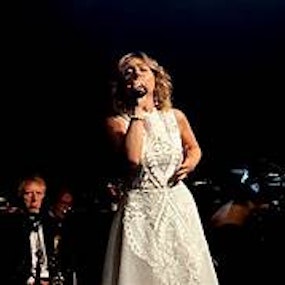
Danielle Soccio
Danielle was quick to make her public mark as a singer and actress, writing and producing one-woman shows, performing at premier concert halls along side Australia’s stars of stage and screen, and on live television, before viewing audiences of millions of people in Australia and overseas. She has appeared in cabarets and musicals such as The London Palladium's The Sound Of Music for Gordon Frost Productions.
Her clever wit, charm, love of the stage and sharing her voice with the world makes her a natural when sharing her inspiring story in speeches for communities and organizations. Leading others to discover their own untapped talents, courageously share their gifts and fulfil life long dreams too.
Other than singing a multitude of love songs... her passion is helping individuals find their powerful voice and authentic presence and purpose, to become the leaders of their own life. Whether in their singing, speaking, writing, artistry, business, career or personal life. To own their value and voice and enjoy better performances, greater income, happiness and fulfilment.
Featured Episodes
Here are some great episodes to get started with


















